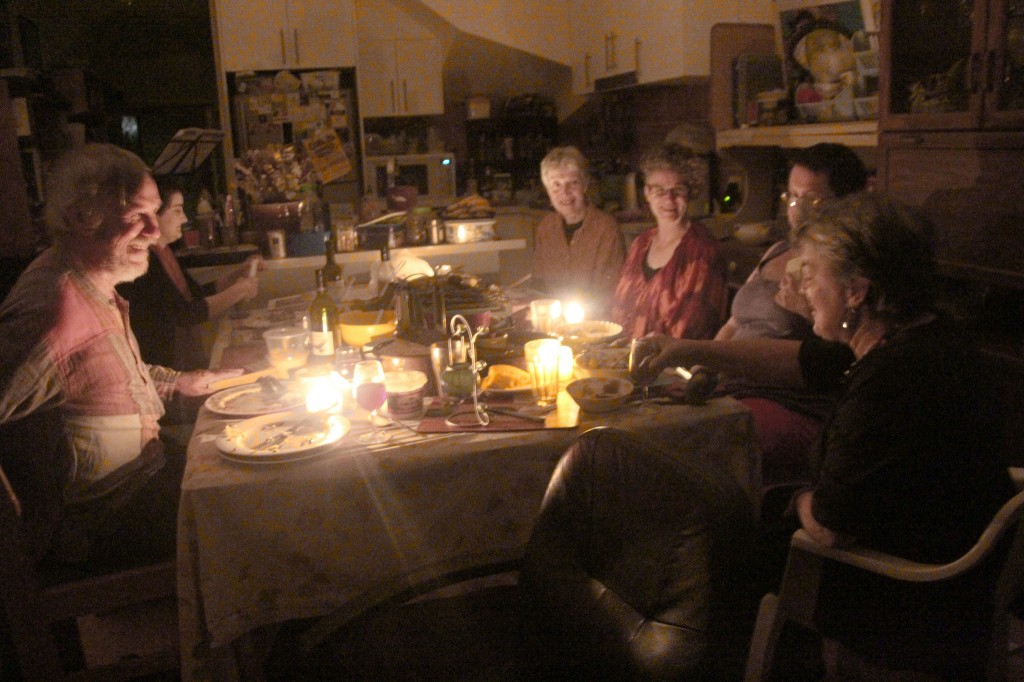
How to Nourish Your Whole Self
Photo Credit: Takver, via Flickr Creative Commons
Eating is central to our very existence. Wilderness experts have determined that we can exist for only three weeks without food. But food is about so much more than just a vehicle for survival. For centuries, in cultures around the world, families and friends have gathered together for a meal, pausing to bow their heads before eating. The sharing of food and meals with friends and family feeds us physically and additionally provides us with an expanded awareness and appreciation for our sacred connection with nature, healing, community, and one another.
food can become a pathway to spiritual well-being and interconnectedness
There is a new model of nutrition that is merging ancient food wisdom with modern science. In her book, The Healing Secrets of Food, author, Deborah Kesten coined the term Integrative Nutrition to describe a holistic approach to eating that nutritional science alone cannot provide. She writes, “While nutritional science can provide objective truth about food (such as the influence of various nutrients on our physical health), it does not flavor food and meals with meaning. Not only have we processed out the initial, inherent integrity of our food, we have also tossed aside the ageless, invisible, meaningful nourishment that food provides not only to our body, but also to our emotional and social well-being.”
Kesten considers the healing secrets of food from the perspective of the nutrients it provides, but also writes about the harder-to-measure healing dimensions of food. She asserts that these dimensions include links to emotions, mindfulness, appreciation, connection, and community. These aspects function interdependently and are profoundly interconnected. Highlighting the holistic healing power of food in no way diminishes the importance of assessing it for its physical, nutritional benefit. What we choose to eat must be a healthful balance of macronutrients (carbohydrates, protein, fat, fiber) and micronutrients (vitamins, minerals) that will contribute to our specific health needs and overall wellness.
The Link Between Food and Emotions
But it’s also interesting to explore the link between food and emotions. Food-mood research zeroes in on the effects that emotions and feelings have on food choices. Dietary changes can trigger chemical, physiological, and psychological changes within the brain that alter our emotions and behaviors. Registered dietitian, Elizabeth Somer, author of the book, Eat Your Way to Happiness writes, “Most people understand the link between what they eat and their physical health. But the link between what you eat and your mood, your energy, how you sleep and how well you think is much more immediate. What you eat or don’t eat for breakfast will have an effect before afternoon and what you’re eating all day will have a huge impact today and down the road.”
When we’re feeling tired, sad or lonely, many of us tend to overeat, favoring sweets and fatty foods, and most often eating them when we are alone. Many of us have felt first-hand the warm, emotionally satisfying glow of consuming, for example, a favorite Aunt’s recipe at Thanksgiving dinner. The field of psychological nutrition is shedding more light on food-related disorders such as binge eating, anorexia and bulimia. Neuroscience research continues to assess how food affects our emotions because of chemical messengers that are released in the brain when eating certain foods.
How Food Connects Us
In addition to the physical, emotional and psychological aspects of food, it can also become a pathway to spiritual well-being and interconnectedness. Vietnamese monk and scholar, Thich Nhat Hahn has explained it most succinctly when he coined the phrase Interbeing. This means to interdependently co-exist. We become mindfully aware and deeply appreciative that our ‘interbeing’ is shared with the plants we eat. This includes those who planted, harvested, transported and prepared the food, as well as the soil, sun and rain that nourished its growth. (See Ornish Living article, How Mindful Eating Makes Us Healthier and More Fulfilled.) Depending on one’s faith tradition, these elements can be considered gifts from the Divine. All aspects are inseparable and are inextricably joined together. Although they are unseen at the dinner table, the food on the plate would not exist if not for the indispensable contributions of these health-promoting co-conspirators along the way.
Every day, we can bring mindful awareness to the necessity of feeding ourselves both inside and out
Recalling Our Nourishing Memories
Think right now of a favorite past food experience. More likely than not, it included the company of cherished others. Perhaps a festive holiday gathering comes to mind, or an intimate dinner for two. I recall a treasured memory of a holiday gathering many years ago that marked the first away-from-home reunion of my parents, all of my siblings and their spouses and children, in a big, rustic cabin in the mountains of California.
“We should look for someone to eat and drink with, before looking for something to eat and drink.”
Each night we took turns recreating our favorite meals from childhood. The food was delicious but was consistently overshadowed by conversation, laughter and sometimes even tears. I also remember, like it was yesterday, two college students (my future husband and I) who had recently just met, huddled together on a blanket for a picnic outdoors on a sunny, but very chilly, November day decades ago. The menu included two peanut butter and jelly sandwiches, two apples and one large hot cocoa that we shared. We were typical students who had little money for dining out, but that hodge-podge, peasant lunch remains one of my richest and sweetest memories.
Not just on special occasions, but every day, we can bring mindful awareness to the necessity of feeding ourselves both inside and out. For optimal health and well-being, we must continue to consider our food as more than just fuel. From the far reach of ancient Greece, this poignant instruction from philosopher, Epicurus still resonates, “We should look for someone to eat and drink with, before looking for something to eat and drink.” What we eat, and equally important, how we eat and with whom will guide us in celebrating the social, ceremonial and sensual delights of eating in a manner that nourishes the whole person.
In what ways has sharing meals with others contributed to your social and emotional well-being?








